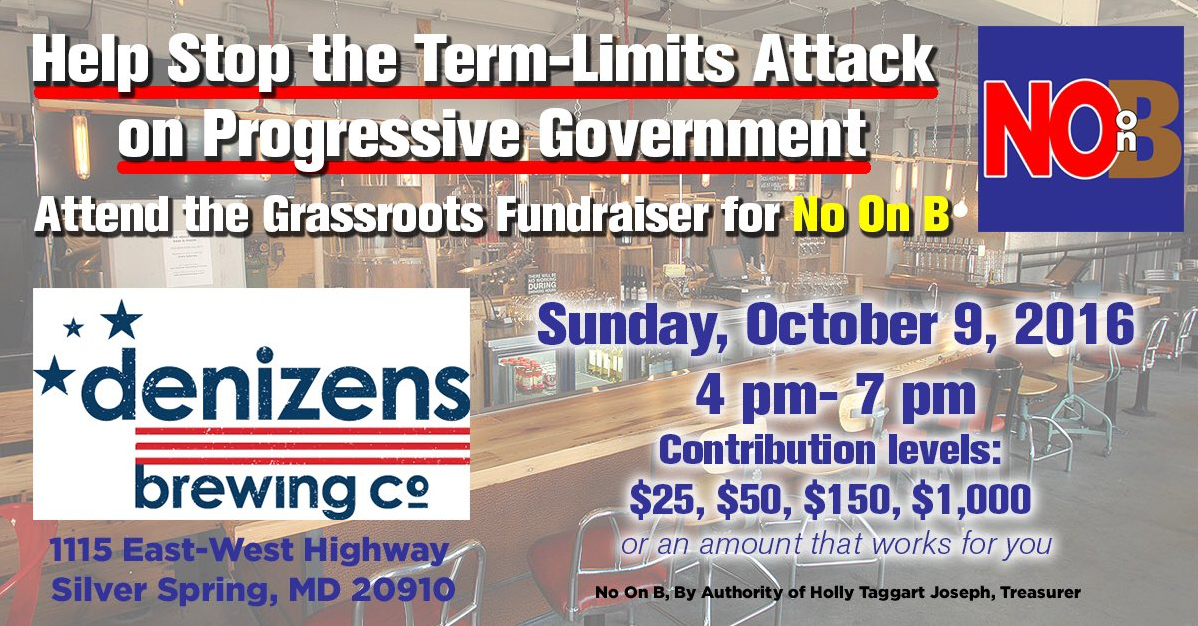By Adam Pagnucco.
In a thundering rebuke to Montgomery County’s governing establishment, voters have passed term limits by a 38 point margin with early votes and election day votes counted. Folks, let’s call this what it is.
A Revolt.
This year will see one of the largest electorates in Montgomery County history. While the absolute number of voters may be declining in our mid-term elections, it has been steadily rising in presidential general elections. County residents voted overwhelmingly for Hillary Clinton over Donald Trump (by 54 points as of this writing). But they also voted for term limits despite the fact that most county voters are Democrats and all county elected officials are Democrats. This year was reminiscent of the 2008 general election, during which MoCo voted for Barack Obama by 45 points but also approved Robin Ficker’s charter amendment restricting property tax hikes by just 5,060 votes. This demonstrates the capacity of county voters to keep national issues and local issues separate when they so desire. The big difference between 2008 and now is that the margin of term limits’ passage was so titanic that it’s possible that half of all Democrats voted for it.
The scale of this upheaval is virtually unprecedented. Sure, County Council incumbents have been defeated here and there and a sitting County Executive was beaten in 1990. But the voters voted against all the incumbents this year, or at least put an expiration date on their services. To find something comparable, you would have to go back to 1962, when five of seven Council Members were ejected, and 1966, when six Council Members were defeated.
Former County Council Member Steve Silverman astutely characterized term limits supporters as “a convergence of strange bed-fellows.” County employees upset about reduced raises, business people unhappy about what they see as an unfriendly business climate, residents opposed to new master plans with more density, Republicans and unaffiliated voters angry about being marginalized, opponents of the county’s liquor monopoly, people upset about the recent Giant Tax Hike and nanny state laws, and those who genuinely regard term limits as facilitating good government came together as they never have before. As David Lublin wrote, these groups may have had incompatible visions of what county government should be, but all of them believed the way to get there was to get rid of the incumbents.
Term limits opponents made two primary arguments. First, they described term limits as “an attack on progressive government.” This had the effect of making the term limits question a referendum on current county elected officials, a perspective actually shared by many supporters.

And second, they tried to make term limits toxic by emphasizing their support by figures like Donald Trump, Robin Ficker and Help Save Maryland.

That strategy didn’t work for two reasons: the opponents were vastly under-funded as they were going uphill and the message itself was not calibrated for a general electorate that is less liberal than Democratic primary voters. Social media proved to be the weapon of choice for both sides, and in terms of Facebook likes, supporters outgunned opponents by a ratio of 13-1. Opponents were counting on the Democratic sample ballot and the Apple Ballot, both opposing term limits, to win. But whereas the sample ballot is often mailed to all county Democrats, this time around it was mailed only to those who had newly registered. And the teachers union did not supplement its Apple Ballot poll coverage with multiple mass mailings as they do in mid-term years. Accordingly, the impact of both ballots was blunted. Opposition organizer Tom Moore made a valiant effort, but this was an unwinnable campaign from the start.
To be fully understood, this year’s vote must be put into the context of recent history. Since 2008, county voters have decided four major ballot questions and each time they took what was arguably the less progressive position. Put those four votes together and here is the message from the voters:
We don’t want more property taxes. We don’t want more government fees. We don’t want a labor union running the police department. And even though most of us are Democrats, we are telling the Democrats who run the county government that twelve years in office is long enough.
This is pretty much the opposite of the long-standing posture of the county’s political establishment. And it’s not just coming from flakes, fanatics and fringe types like Robin Ficker and Help Save Maryland – it’s coming from a majority of county voters. If there was ever a moment for the governing class to do some soul searching, this is it.
Opponents of term limits may be right about one thing – they may change the names of elected officials, but not the type of them. Democrats, often very liberal ones, will continue to be elected because of our closed primary system. But the combined message of the last four ballot questions imposes a hard choice on the elected officials of today and tomorrow. They can try to balance the interests of various constituencies across the political spectrum at the possible cost of losing the progressive support that influences Democratic primaries. Or they can stay the course and watch more moderate general election voters pass even more restrictive ballot questions, including perhaps the ultimate bane of progressivism – a hard tax cap.
